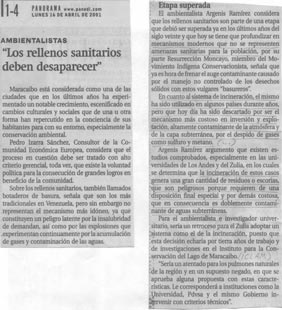
It is important that people become aware of their influence on the environment. The waste dumpsites form a threat to public health. In many countries incineration is applied, but is not accepted anymore nowadays, as it brings high investments and high maintenance costs. Incineration is also very harmful for the atmosphere and soil. It generates vast amounts of very toxic waste. The storage of this waste is very costly and it continues to be a threat to the water quality. A different solution is needed for our waste. For this reason cooperation is needed between government, industry and universities.
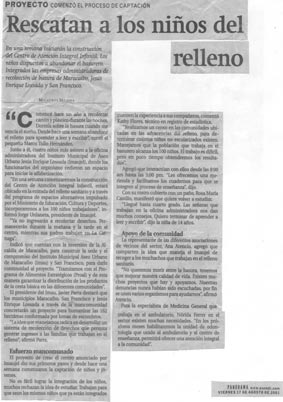
The children of the dumpsite must be saved.
According to Jorge Urdaneta, director of the dumpsite La Cienaga, the construction of a centre for the children of the dumpsite starts within a week. This centre is supported by the Ministry of Education, Culture and Sport. The children will stay the whole day at the centre, when their parents collect recyclable waste on the dumpsite. The children get also food distributed. The investment is a cooperation between the municipality of Maracaibo and the Sanitary Service. According to Javier Parra, director of the Sanitary Service, by this project the families are able to continue generating income with recycling, but the children are better protected.
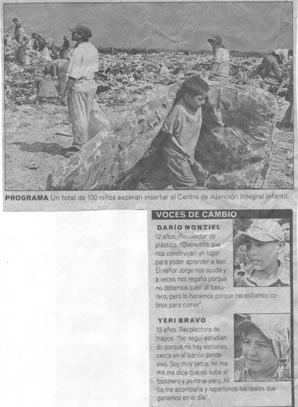
The people concerned speaking:
Ana Atencio: “We do not want to die between the waste. We want to improve the quality of our life. In former days we often asked for support, but we where never paid any attention. At last several organisations are going to work together to help us.”
Dario Montiel (12 jr.): “We are glad because there comes a school were we could learn to read. Mister Jorge says that we can not go on the dumpsite, but we have to. Here we live of.”
Yeri Bravo (13 jr.) is also glad with the school. “Where we live is no school. My mother says that I shouldn’t go to the dumpsite, but I am stubborn and I go along with my aunt to deserve a couple of pennies.”

Miriam Suárez: “The dumpsite are a source of illnesses. You can find there use needles and other things from the operation chamber. Much of the young people that live on the detritus have infections. The hospitals and the sanitary service must cooperate to improve this situation.”
Juan Romero: “All organisations concerned with the environment should give training about ways how to recycle waste.”
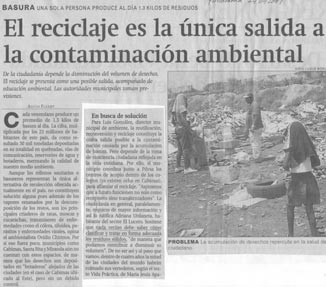
In Venezuela every day 30,000 tonnes of waste are produced. This comes all in streams, rivers and lakes, on public grounds and on open dumpsites. This destroys the environment. It is not only ugly to see, but attracts rats, cockroaches and flies, and spreads illnesses, such as cholera, typhus, parasites and viruses.

(Continuation)
As a result of the consumer society it doesn’t make a difference to people what happens with this waste. Also nobody knows what the impact of this dumped waste will be. The complete society must cooperate in the shaping of a new culture. In the whole world solutions should be searched, especially for the large world cities such as Cairo, Bangalore and Bogotá.
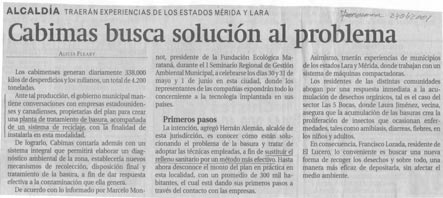
In the Zulia Region (in which the city Maracaibo lies) each day 4,200 tonnes of waste are produced. In the city Cabimas a new system for waste separation is being searched, to replace the waste dumping. A conference will be organised for which companies from the all over the world will be invited to show their technologies. It is also proposed to teach all inhabitants to separate their waste streams.